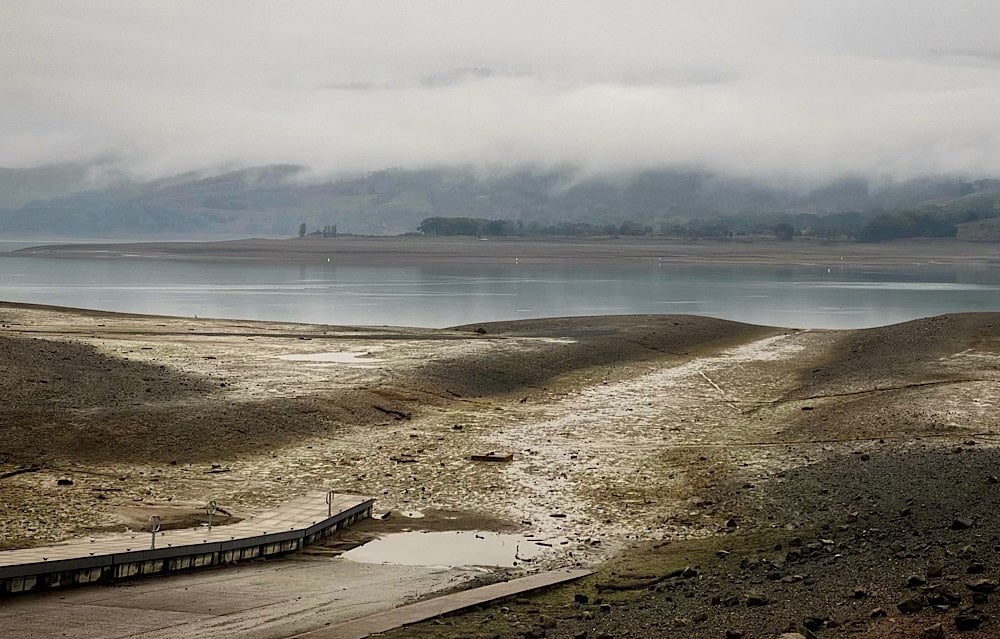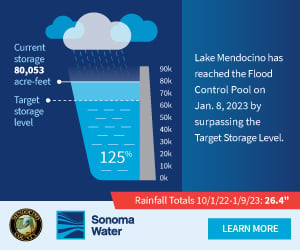Note: Lana Cohen is a Report For America fellow covering the environment & natural resources for TMV & KZYX. Her position is funded by the Community Foundation of Mendocino, Report for America, & our readers. You can support Lana’s work here or email [email protected]. Contact Cohen at LCohen@mendovoice.com. TMV maintains editorial control.
The first Ukiah Valley Basin Groundwater Sustainability Agency public meeting will take place on February 23, from 5:30 p.m to 7:00 p.m. You can find out more information and register for the zoom here.
LITTLE RIVER, 2/12/21 — After a three month hiatus, the Ukiah Valley Groundwater Sustainability Agency’s board held their first meeting of 2021 yesterday, at which they approved new board members, adopted an updated communication plan, and formally gained access to two parcels of land where they will expand their groundwater monitoring network as they work towards their goal of fully regulating and managing groundwater usage by June 2022.
(See our previous reporting on upcoming groundwater regulation for the Ukiah Valley here)
In the past, no government has regulated groundwater usage in Ukiah nor in California. However, a 2015 law, the Sustainable Groundwater Management Act (SGMA pronounced like the Greek letter Σ), changed that.
Groundwater, drawn from underground wells, has been historically treated as private property, mostly controlled by individuals, but as groundwater management begins to take hold in California, that will change. Soon, aquifers and well water across the state will be closely managed by local jurisdictions and the California Department of Water Resources (DWR).
The law requires local governments in areas with potential for groundwater overdraft to establish a plan to manage their groundwater sustainably for years. The DWR oversees the process.
In 2015 the DWR listed the Ukiah Valley’s groundwater basin as one of 94 basins in the state at risk of overdraft — meaning at risk of running out of groundwater. So, in 2017, the Ukiah Valley Groundwater Sustainability Agency (GSA) was created through a joint powers agreement between the Russian River Flood Control District, the Upper Russian River Water Agency, the City of Ukiah, and the County of Mendocino.
The agency is charged with creating a plan for managing the groundwater basin, which will define how much groundwater is used and by whom in and near Redwood Valley, Calpella, and Ukiah. For four years the Groundwater Agency has been gathering information, getting organized, talking to local politicians and trying to figure out what exactly the basin needs — now they’re expanding their monitoring network, answering questions about how much water can be used without overdrafting the basin, figuring out how climate change will impact the regions groundwater supply and preparing to begin regulation by June 2022.
How much land can be irrigated, how much water can be supplied to urban areas, how many people and communities can be supported, how can water availability be maximized given our limited supply and growing demand?
Those are just a few of the many questions the agency is working through right now.
Thursday’s meeting was packed full of information. If you want to watch the full meeting, which was a little over an hour and a half long, you can find it here, on Mendocino County’s YouTube page.
This was the first meeting with some new leadership in place. Mendocino Co. First District Supervisor Glenn McGourty took over for Carre Brown as the County’s representative on the board. After more than a decade as supervisor, Brown retired after completing her term in 2020. Amber Fisette, deputy director of transportation for the County, took over as the plan manager for the Agency from Sarah Duckett, who left the County, also around the new year.
The meeting started off with some housekeeping. Wine grower Zachary Robinson was re-appointed as the agricultural representative on the Groundwater Agency and James Green was appointed secretary. Appointing a new tribal representative was on the agenda for yesterday’s meeting, but the agency had not received a nomination for the seat as of yesterday and therefore tabled the appointment until next month’s meeting.
Andrew Bake, an AmeriCorps fellow working with the Mendocino Water Agency to implement the Ukiah Valley Basin’s groundwater sustainability plan, and Amber Fisette said they are in contact with tribal leader Javier Silva of the Sherwood Valley Band of Pomo Indians and representatives from the Redwood Valley Rancheria.
Next, the discussion turned to expanding the Agency’s groundwater monitoring network. The Groundwater Agency is still trying to nail down what the present status of the Ukiah Valleys two aquifers are.
“We’re working on developing a plan, and the first part of it is to understand: what are the boundaries, and the condition of the aquifers beneath Ukiah Valley,” said Supervisor McGourty, in an interview after yesterday’s meeting.
Once they have a better idea of the state of the aquifers, the Agency can move forward with deciding how to manage the resource.
Engineers from Larry David Associates, a consultancy that specializes in groundwater management and is working with the Agency, are gathering data from a growing network of wells to track the groundwater system. At yesterday’s meeting, the Groundwater Agency’s board approved two land agreements that will allow access to wells located on Mendocino Wine Company and Millview County Water District property.
“These wells will build out the Monitoring Network [sic] being incorporated into the GSP [Groundwater Sustainability Plan],” noted the meeting agenda.
The meeting also covered the Agency’s communication and engagement plan. The plan was created with the stated intent of promoting communication about and public engagement with the groundwater sustainability plan and had recently been updated to reflect the ongoing pandemic and need for continued virtual meetings. The communication plan, which was approved in yesterday’s meeting, can be found in the agenda packet for yesterday’s meeting. External communication methods suggested in the plan include public meetings, interviews, radio broadcasts, emails, and newsletters, among other things.
Next Steps
Slowly but surely, the Groundwater Agency is starting to understand what the current state of the aquifers underneath the Ukiah Valley are, a difficult task.
Larry David Associates engineer Laura Foglia explained during a zoom interview that there are still data gaps which she and her colleagues are trying to fill in. In order to do that they are expanding their monitoring network and using information they have gathered and a model they have created to run scenarios that can show different potential futures for the groundwater basin. Foglia said this is the meat of sustainability plan.
“We are planning, in the next couple of months, to have a big portfolio of scenarios that we can discuss with the board and with the [technical advisory committee] so we can start making decisions on which direction the plan is going to take.”
Even with all the data already gathered and compiled, models created, and scenarios almost ready to run, a lot is still up in the air, explained Foglia.
“One of the challenges is to understand the connection between surface water and groundwater and how groundwater management can really impact or improve the condition with the surface water-groundwater interaction. The second challenge is that the climate is changing so we are having different types of precipitation events with this big atmospheric river and it’s making a difference in how the basin is recharged just naturally and that’s a big component and if things keep going in this direction we will need to be creative in how to store water for use in the summertime.”





Nice. More needless regulatory entities to enforce policies upon property owners. Im sure it will have the effect of hammering the little guy, while the pop up wineries everywhere will suck the aquifers dry. California has done a PISS POOR job when it comes to water storage. (And plenty of other things). But not to worry, since people are leaving in DROVES there will be a few gallons left to fight over…
Racing to drill the deepest well is a loser’s game.
Follow the links in the article.
Thikaboutit.
Property owners spend thousands to drill a well on their land. They are then taxed on the improvements. Now to slap a meter and a charge (we know there will be a fee for that monitoring) to monitor your private property. Gov’t overreach at its finest. Another way to bring in revenue under the guise of the greater good for all. We are taxing you into poverty for your own good! Monitor the wineries and leave the private residences alone. Enough already.
As a property owner, I want to be able to continue to draw from my well.
The wineries will be monitored too.
Nooooo!!!! This violates our rights as land owners!! Not OK. How can it be legal to tax or regulate my land or what is on it or how I use it??? Are they going to start taxing my trees next?? Where does it end?
When I first read this article I had a feeling that there would be a negative result. Understand, the UVBGSA has no desire to put meters on wells. It is true that they have the power but the desire is not there. As for myself, I know that good data will greatly improve the decision making processes. There are two aquifers in the Ukiah Basin. They don’t belong to any one person but are shared by those who live here. You don’t want your neighbor pouring his crankcase oil down his abandoned well nor do you want him hogging all the water. Those are things that can effect all of us including you. So, if asked, consider volunteering to have your well metered. I’m sure it would be greatly appreciated and it would assist in sound decision making.
Thank you for these comments, Mike Webster. I also encourage public participation and interest in the Groundwater Sustainability Plan development.
I won the bet. Just like all of the author’s other articles, just had to work in “climate change” somewhere. (The Big Bad Wolf of every story.) Yet, no mention of drought, which is a major part of the well water usage problem. California has experienced droughts in 1841, 1864, 1924, 1928–1935, 1947–1950, 1959–1960, 1976–1977, 1986–1992, 2006–2009, 2011–2019, and 2020. Droughts may be due solely to, or found in combination with, weather conditions; economic or political actions; or population and farming.
Where does the stealing end? Monitoring my private water usage so big business can benefit? Why would anyone agree to that? You didn’t pay for up keep or drilling my well why should UKIAH well water management team make money off me ? I don’t get why this crap gets voted in!! IS THERE JUST NOT ENOUGH INTELLIGENT PEOPLE LEFT TO GET RID OF BUSINESS LIKE THIS ?
I encourage the public to review the materials available on Mendocino County Groundwater Sustainability Agency and it’s Technical Advisory Committee. (link at end of comment.) While I applaud the article in bringing the importance of groundwater management to the public’s attention, the interpretation of this public process is not wholly correct. The work being done will contribute to the better management of the local water supply for ALL. A much larger uncertainty to the region’s water system is the relicensing of the Potter Valley Project and its impact on Lake Mendocino. A more immediate concern is that of the current drought situation. Perhaps our local media will soon begin reporting on these issues.
GSA: https://www.mendocinocounty.org/government/affiliated-agencies/ukiah-valley-basin-gsa
Potter Valley Project: https://mendoiwpc.com/our-shared-water/
This is another ridiculous government overreach project! Taxation for punishment until all have complied with the wishes of whomever wants to cheat to be in charge at this time. Unconstitutional taxation is coming to an end. Those responsible for this madness will be tried for their part in it. Caution should be exercised in all of your actions. God and WE THE PEOPLE are watching!